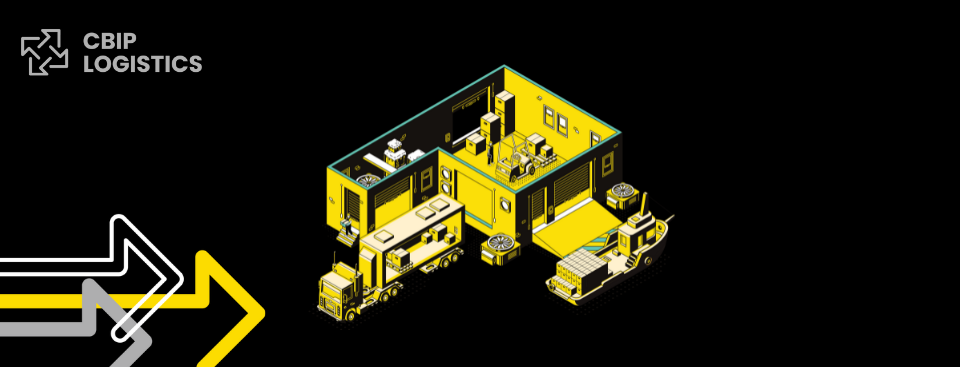FBA vs FBM: Which e-commerce fulfillment option is right for you?

You’ve developed your product, listed it on Amazon, found a customer base, and the orders have finally been placed. Now, however, comes the difficult part: fulfillment.
In the ever-changing landscape of e-commerce, fulfillment — or, in simpler terms, getting goods to customers’ doors after an order has been placed — remains a constant source of stress for many businesses.
Read About CBIP’s Global 4PL Logistics Services
Today, nearly 40% of shoppers say they’ll skip an order if it’s expected to take longer than a week to arrive. And when time is of the essence, you can’t afford any missteps.
The good news is that you have options for fulfillment and last mile shipping of your goods listed on Amazon.
Let’s take a closer look from a global e-commerce company’s perspective to see how each type of fulfillment works and what best fits the unique needs of your business best.
OPTION 1: FULFILLMENT BY AMAZON (FBA)
FBA PROS
Amazon fulfillment began in 2006, allowing small businesses to use its massive network of warehouses and shipping providers. Though its capacity to list goods grew exponentially, there wasn’t always a clear way to ‘fulfill,’ or get products to the customer’s door. Now, Amazon has integrated shipping with its listings through FBA.
In order to use Amazon fulfillment, e-commerce merchants pay two fees. The first is a which a fulfillment fee covering packing, shipping, and customer service in addition to a monthly inventory fee.
For companies listing their goods on Amazon, the selling points of FBA include:
- Prime Shipping: These days, Amazon Prime alone accounts for roughly 200 million users worldwide. Sellers today often opt to have orders fulfilled by Amazon to keep up with the rising expectations of fast shipping that Amazon helped to establish.
- Customer Service: retailers can access Amazon customer service, which is available 24/7 with a quick turnaround time (typically 2-3 days at a maximum).
- Return Management: handling returns can be a source of serious frustration for many retailers. With FBA, Amazon takes over and handles returns for you.
If your company can follow Amazon’s guidelines and cover these costs, the integrated system allows you to begin sales quickly. Despite these advantages, though, there are still a number of other factors to take into consideration before deciding to fulfill exclusively through Amazon.
RELATED: How to Take Your E-commerce Business Global
FBA CONS
While any seller can opt to carry out fulfillment through Amazon, that doesn’t always mean it’s the right fit.
One reason is that Amazon uses a warehousing practice called commingling. Commingling refers to the practice of putting the inventory of different companies together in a warehouse.
While it can simplify fulfillment for companies and help to increase the speed of deliveries, there is also the potential for fraudulent or counterfeit products to end up alongside your goods — or worse, get labeled as your order.
In addition to the costs and commingling, another potential disadvantage to using Fulfillment by Amazon is that you have to play by their rules. That means you could be out of luck if you:
- Like to conduct warehouse inspections yourself
- Want to adapt on the go to consumer preferences and changes in your stock.
- Don’t want to take on a long-term storage fee. This is key for small retailers who are still ramping up the volume of their stock — after 6 months, Amazon applies a semi-annual long-term storage fee that could drive up your costs significantly early on
- Want more access to inventory. With Amazon, you won’t get a dedicated space for your own inventory, in turn limiting your growth potential.
OPTION 2: FULFILLMENT BY MERCHANT (FBM)
FBM PROS
Fulfillment by Merchant (FBM) is when your business takes on logistics itself or outsources the operation to another logistics partner other than Amazon.
In times of major shifts in the logistics landscape like COVID-19, having Amazon in full control caused serious problems for many sellers.
Amazon shifted its policy and delayed shipments of all goods that weren’t already in a warehouse. This created massive delays and left many sellers unable to ship orders for a full 30 days — a far cry from the two-day delivery they’d come to expect. While Amazon’s system was the cause of the issue, companies themselves had to deal with the consequences. This event led many businesses to create plans to handle at least part of their own fulfillment.
Today, 43% of sellers on Amazon handle at least some of their shipping using other non-Amazon providers. This number is up nearly 10% from the previous year.
While sellers need to make sure their goods meet Amazon’s requirements in terms of labeling, utilizing this method means they can take full control from start to finish. Partnering with a competent logistics provider using FBM unlocks a host of benefits, including:
- Fewer fees from Amazon and a way to only take on costs of services you use in a given month
- Much more control over your fulfillment process from start to finish, including the ability to make warehousing changes
- More opportunities for organic growth
- The ability to react faster to changes in the market
FBM CONS
Even though FBM puts a company in control of its logistics, there are a few potential downsides worth noting.
If your e-commerce business doesn’t use FBA, it can be costly in the beginning to find a logistics plan that matches up to their rapid delivery system.
Another consideration is Amazon Prime. For some shoppers, the promise of two-day shipping is perhaps the most important selling point. As noted in the case of COVID-19, however, receiving deliveries in two days isn’t a guarantee 100% of the time. Though FBM doesn’t make your goods prime-eligible, it also doesn’t mean you’re unable to deliver quickly and efficiently another way.
If your company wants to grow organically and independently, these potential downsides are likely to be insignificant in the long run. By partnering with a competent, experienced logistics team, you’ll be able to pave the way for your e-commerce business to develop in a way that makes sense — not by always deferring to Amazon.
WITH CBIP, YOU GET AN INTEGRATED TEAM OF LOGISTICS EXPERTS FOR YOUR E-COMMERCE BUSINESS
If you want to maintain control of your domestic and global e-commerce fulfillment operations but need a trusted partner to keep things running effectively, we’ve got you covered. We handle the complex aspects of your supply chain so you can focus on growing your business.
At CBIP, we think the days of shipping through one super-provider are over. We combine proprietary order tracking and warehouse management softwares with a bespoke supply chain tailored to your needs that is transparent and adaptable.
Have a say in your fulfillment. Get in touch today for a free assessment to craft a logistics plan tailored to your business.






